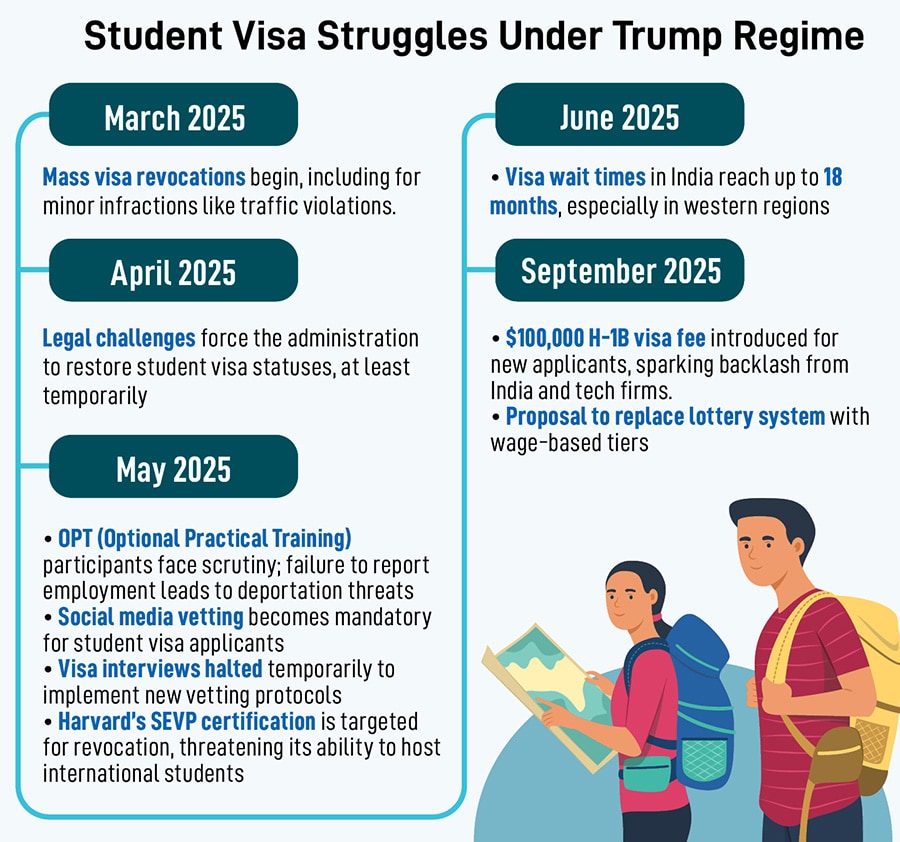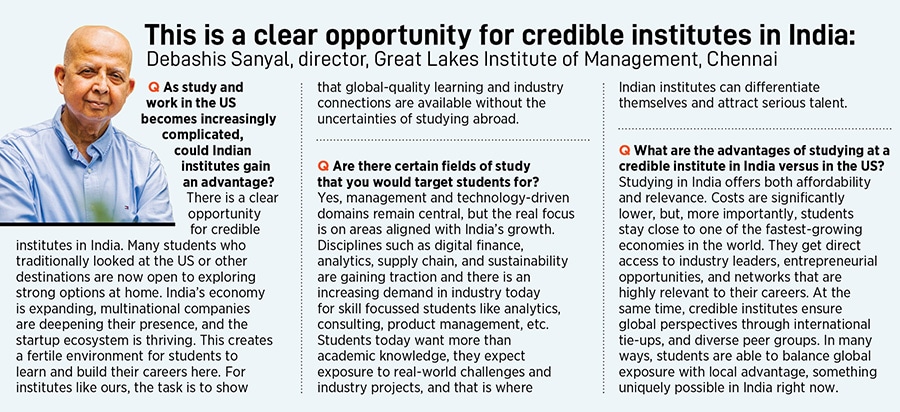When Pratham Jain graduated in May with a Master’s in Business and Science from a reputable US university, job-hunting wasn’t the main hurdle.
“In the beginning, my focus was on classes, internships and making the most of the campus life. But as graduation got closer,” he says, “the visa conversation started to overshadow everything.”
US President Donald Trump returned to office in January, and immediately began to tighten immigration policies. In the past few months, the US has revoked more than 6,000 student visas (later restored by law), begun social media vetting for student applicants, and, most recently, announced big changes to the H-1B or employment visa, which most Indians graduating from US universities hope to receive eventually.
In the past week, the US has slapped on a $100,000 one-time fee for new applicants; earlier, the H-1B visa fees ranged from $2,000 to $5,000, depending on company size and processing speed, according to the Immigration Law Group.
Trump has also proposed switching the current H-1B lottery system for a wage-based approach; those in the highest wage category would enter the pool four times, and those in the lowest, only once. This means that entry-level employees, largely recent graduates, have fewer chances of gaining the golden ticket.
“Every international student I know keeps one eye on their grades and the other on Washington, because even a small policy change can completely reshape your career path,” Jain says. “It’s almost like earning a second degree here, one in navigating immigration paperwork, deadlines, and constantly changing policies.”
In the two years that Jain has been in the US, he feels a tangible shift.
“Back then, the path ahead felt clear: Complete my degree, find a job, have my employer file for an H-1B, and continue to grow,” he adds. “In just the past few months, though, that sense of certainty has disappeared. Nothing feels settled anymore.”
![]()
While the H-1B changes have brought the conversation back to the fore, for students like Jain and aspiring US university candidates from India, this is only the latest in a series of events that have rattled their confidence over the past few months.
Kim Dixit, co-founder and CEO of study abroad consultancy The Red Pen, says that while they have received several calls from anxious parents and students in the past few days, the cracks began to show months ago.
“April was when the first wave of panic set in, when student visas were getting revoked,” she says. “Parents were asking, ‘Will my child be safe?’. Then there was the issue of the social media declarations, but even before that, was the stopping of all visa appointments. People didn’t know if they would get their visas in time.”
And even when slots opened up, students were finding that their visas were being rejected.
“It’s not like the situation with the H-1B is causing great panic—because there was already panic,” Dixit says. “This is the last straw, though, because earlier you had the hope that even if it was difficult to get there, you would maybe land a job. This makes it so much harder to get a job.”
It’s important to note that students already in the US on F-1 student visas, applying for H-1B status, will not be impacted by the new fee hike; it applies to new applicants outside the US seeking entry.
“That said, the uncertainty around these rules does create hesitation among employers, which indirectly impacts international students like me,” says Sarvesh Kharche, who is pursuing a Master’s in Data Science at a US university.
Moreover, if the lottery system makes way for the wage-based system, chances of getting to an H-1B visa significantly dim for students and recent graduates.
“Each day feels like a new struggle, marked by uncertainty and stress. Our future often seems to hang by a thread,” says Vasu Reddy, also a Master’s student of data science in the US. “Being away from family, adapting to a new culture, and constantly working to prove myself in a competitive environment has been challenging. Despite the resilience I have built, I cannot help but feel nervous that all this hard work and sacrifice might be overshadowed by circumstances beyond my control.”
![]()
Plan B
Should Indian students look for alternatives to the US?
The short answer is, yes. But it depends on various factors, including the age of the aspirant.
“For students in the 10th grade, who are beginning to think about college, we remind them that there's a good chance Trump won’t be in office by the time they get to university,” Dixit says. “We’re not asking our current applicants to jump ship yet, either. But the main messaging we’re discussing internally is to make sure that people see the rest of the world as a good option. Apply to the US but keep your options open.”
In many cases, she adds, the other option may be better than the US choice. “For a course like data science, for instance, you could find something in Europe that’s as good as in the US, and where you’ll get a job immediately,” she says. “We can move focus away from the US, and not from the point of view of taking a second choice. The world is big, and this is a good opportunity to expand your search and plans.”
Reddy agrees: “At present, the US poses particular challenges—with inflation, evolving visa regulations, and an overall difficult environment for students. For those aspiring to study here, it is important to remember that pursuing your dreams does not depend solely on one country. There are multiple pathways to achieve success, and the US is only one of the many options available.”
Dixit says that while the UK remains a popular choice for Indians, many aspirants are considering the Netherlands and Germany in Europe (which have options available for English-speaking students) as well as countries like Singapore, and overseas campuses of US universities, such as NYU (New York University) offshoots in Abu Dhabi and Shanghai.
Advantage India?
Meanwhile, universities in India are closely monitoring the situation, and seeing increased interest from students who originally hoped to study in the US.
In fact, in June, Haryana-based Ashoka University opened a special admissions window for those facing visa-related challenges to the US.
Students had to submit proof of confirmed offers from universities in the US, and were eligible to apply to Ashoka University’s undergraduate programme, commencing in August.
“Applications were processed only upon receipt of the documents; others who had already applied to Ashoka for 2025 intake were not eligible for this special round,” a spokesperson told Forbes India via email. While the institute didn’t share actual figures, they claimed that the announcement ‘generated significant interest among students who initially planned to study in the US, reflecting growing interest in high-quality education options within India’.
The highest interest has been in degrees related to computer science (CS), economics and psychology, along with students opting for mathematics, physics, biology, and international relations, the spokesperson said.
“Studying in India offers both affordability and relevance. Costs are significantly lower, but, more importantly, students stay close to one of the fastest-growing economies in the world,” says Debashis Sanyal, director–Great Lakes Institute of Management, Chennai. “In many ways, students are able to balance global exposure with local advantage, something uniquely possible in India right now.”


